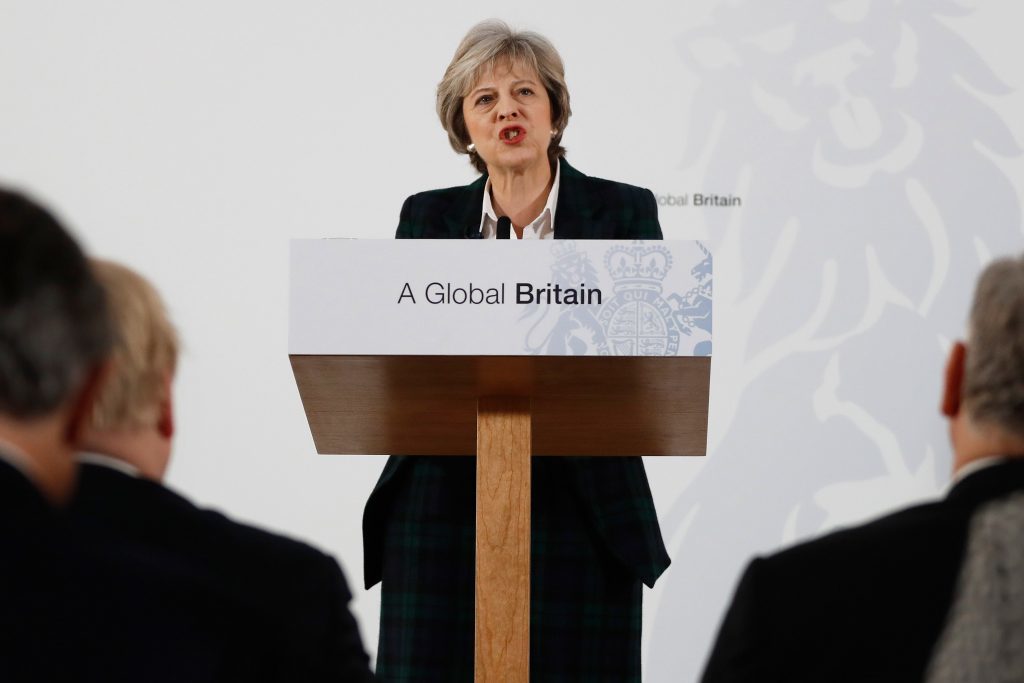
European newspapers have responded to Theresa May’s speech setting out her priorities as she negotiates the UK’s exit from the European Union (EU) with a series of striking front pages.
The Prime Minister confirmed on Tuesday that Britain will quit the single market and warned she will walk away from exit talks rather than accept a “punitive” deal.
The front page of German national daily Die Welt features Mrs May’s torso with a Union flag in the background, and the words “Little Britain” below.
She is pictured wearing a blue checked blazer and white shirt with matching red lipstick and nail varnish – a nod to her previous “red, white and blue” Brexit reference.
Italian daily La Repubblica leads with the headline “Brexit, London gets its wall, ’away from the EU and the common market“’ (translated from the original).
The Spanish newspaper El Pais does not top with Brexit, but there is a mention of Mrs May’s speech in the top right of the title page.
It references the Prime Minister’s announcement that Britain will leave the single market, adding that Mrs May is hoping for a hard Brexit subject to Parliament’s vote.
It calls the announcement her “most important speech” since coming to Downing Street.
Meanwhile, the Prime Minister faces a grilling by MPs over her Brexit plans after confirming Britain will quit the single market and warning she will walk away from exit talks rather than accept a “punitive” deal.
The Prime Minister set out plans for a “bold and ambitious” free trade agreement allowing the UK to continue doing business with its 27 former partners without paying “huge sums” into EU budgets.
Labour warned the PM was on course to turn Britain into “bargain basement economy” while the European Parliament’s chief Brexit negotiator insisted the days of Britain cherry-picking its relationship with Brussels were over.
Mrs May will be quizzed by MPs about the divisive strategy when she appears in the Commons for Prime Minister’s Questions.
The premier confirmed Parliament would be given a binding vote on the final deal but the result will not stop Britain leaving the bloc.
In the long-awaited speech, Mrs May said she was “confident” a trade deal and a new strategic partnership between the UK and the EU can be achieved within the two-year deadline set out in Article 50, insisting a good deal for Britain will also be good for Europe.
She warned: “I know there are some voices calling for a punitive deal that punishes Britain and discourages other countries from taking the same path.
“That would be an act of calamitous self-harm for the countries of Europe. And it would not be the act of a friend.”
Mrs May confirmed she wants to take Britain out of the jurisdiction of the European Court of Justice and restore control over immigration.
She gave her strongest hint yet that the UK could leave the European customs union (CU), stating she wanted to ensure “frictionless” cross-border trade.
But she said she had an “open mind” on whether that should be done through associate membership or a completely new customs agreement.
Declaring “no deal for Britain is better than a bad deal for Britain”, Mrs May repeated Chancellor Philip Hammond’s warning that if Europe is refused easy access to the single market, the UK could “change the basis of (its) economic model”.
That could mean Britain effectively becoming a low-tax, low-regulation haven like Singapore off the shore of Europe, competing for business and investment with its former partners.
European Council president Donald Tusk said the remaining 27 members were “united and ready to negotiate” while the European parliament’s chief negotiator, Guy Verhofstadt, said the “days of UK cherry-picking and Europe a la carte are over”.
Labour leader Jeremy Corbyn warned she would turn the UK into a “low corporate taxation, bargain basement economy” if the EU did not give her everything she wanted.
Liberal Democrat leader Tim Farron said: “Theresa May has confirmed Britain is heading for a hard Brexit.
“She claimed people voted to leave the single market. They didn’t. She has made the choice to do massive damage to the British economy.”
Recommended for you
